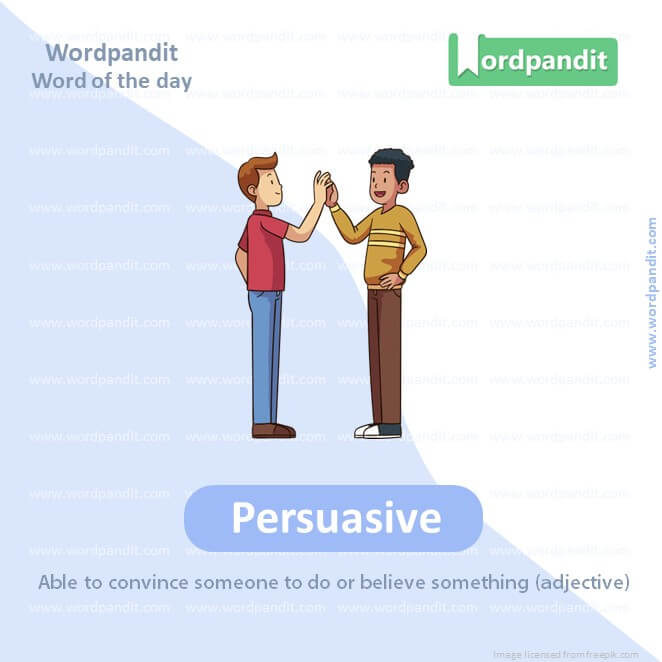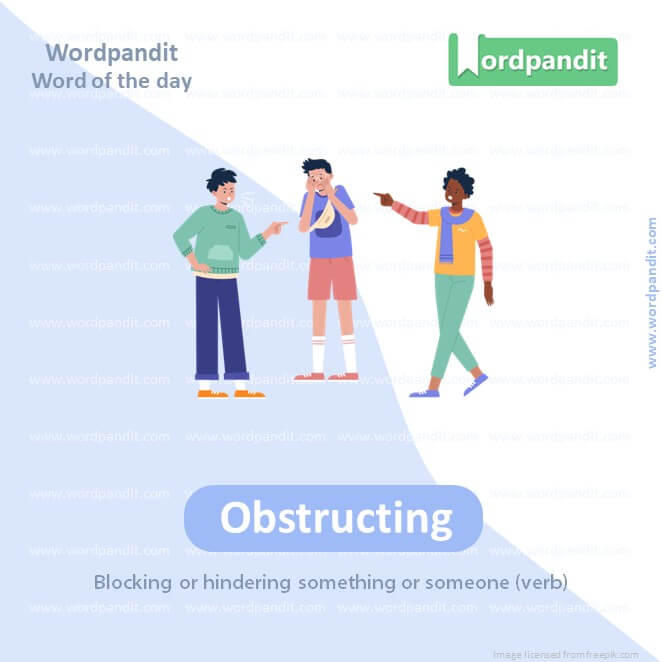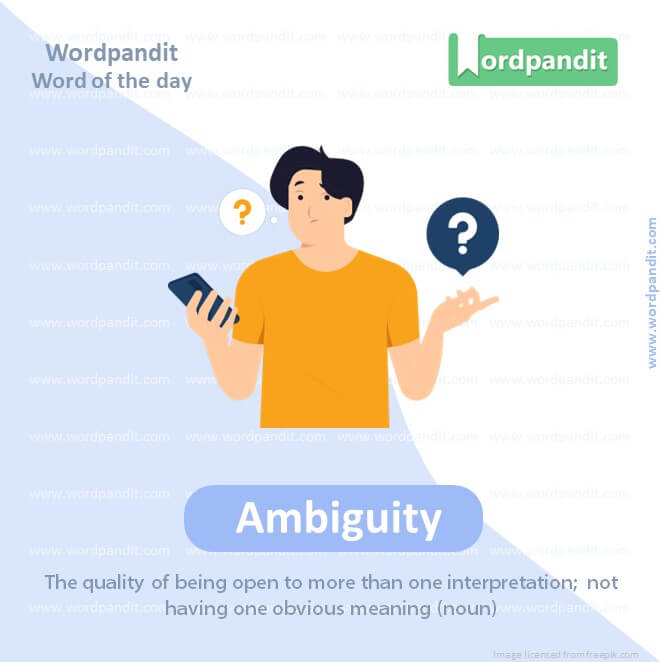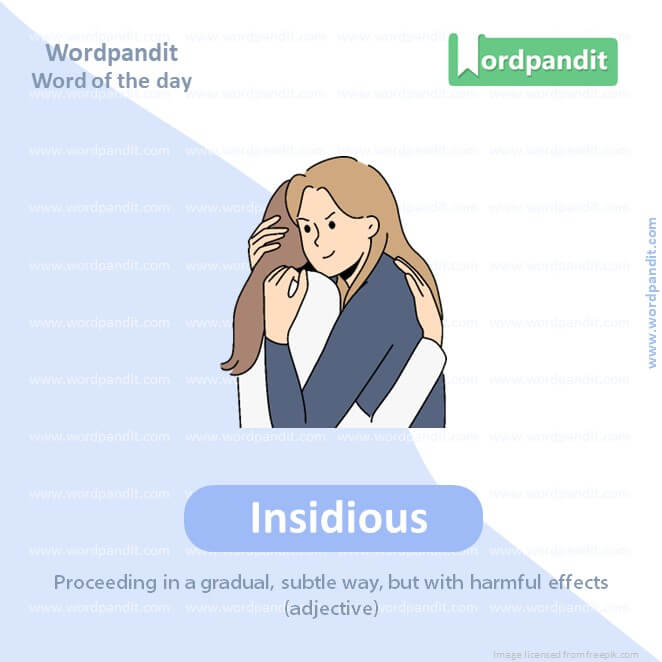Daily Vocabulary Words: List of Daily Used Words in Leading International Newspapers
Hi there. Welcome to this special section @ Wordpandit.
Our endeavour here is very simple: to highlight important daily vocabulary words, which you would come across in leading newspapers in the country. We have included the following newspapers in our selection:
• The New York Times
• The Washington Post
• Scientific American
• BBC
• The Guardian
• Psychology Today
• Wall Street Journal
• The Economist
We are putting in extensive work for developing your vocabulary. All you have got to do is be regular with this section and check out this post on a daily basis. This is your repository of words that are commonly used and essentially, we are posting a list of daily used words. Hence, this has significant practical application as it teaches you words that are used commonly in leading publications mentioned above.
Visit the website daily to learn words from leading international newspapers.

WORD-1: Enfranchisement
CONTEXT: The overall effect is of an emphatic enfranchisement of the rights of people in Gaza.
SOURCE: Guardian
EXPLANATORY PARAGRAPH: Imagine you are playing a game where you can’t make any choices or decisions. Then, one day, you are given the power to make choices and have a say in the game. That’s what enfranchisement is like. It’s when people get the right to make important choices, like voting in elections.
MEANING: The granting of a right or privilege, especially the right to vote (noun).
PRONUNCIATION: en-FRAN-chiz-ment
SYNONYMS: Empowerment, Suffrage, Liberation, Freedom, Voting rights
USAGE EXAMPLES:
1. The enfranchisement of women in the early 20th century was a significant milestone in history.
2. The new policy led to the enfranchisement of several marginalized communities.
3. The documentary highlighted the struggle for enfranchisement throughout the world.
4. Enfranchisement is often a crucial step in achieving democratic equality.

WORD-2: Persuasive
CONTEXT: The ICJ case shows how western logic is wearing thin and its persuasive power waning in a multipolar world.
SOURCE: Guardian
EXPLANATORY PARAGRAPH: Imagine you want your friend to share their candy with you. You talk to them in a way that makes them think sharing is a great idea. That’s being persuasive. It means you’re good at convincing others to agree with your ideas or do what you want.
MEANING: Able to convince someone to do or believe something (adjective).
PRONUNCIATION: per-SWAY-siv
SYNONYMS: Convincing, Influential, Compelling, Effective, Cogent
USAGE EXAMPLES:
1. Her persuasive speech convinced the class to support the charity event.
2. The advertisement was so persuasive that I decided to buy the product.
3. He had a persuasive argument for why we should postpone the meeting.
4. The lawyer’s persuasive skills were evident in the courtroom.
WORD-3: Emblematic
CONTEXT: The court case is emblematic of a wider confrontation that seems to ask, from within the very same institutions that established it, if this human rights infrastructure is real, or just a theatre to be convened in the service of some international caste system.
SOURCE: Guardian
EXPLANATORY PARAGRAPH: Imagine wearing a team jersey. It shows you’re part of the team, right? Emblematic is like that. It means something represents or stands for something else, like how a jersey represents which team you support.
MEANING: Symbolic or representative of a particular thing or idea (adjective).
PRONUNCIATION: em-ble-MAT-ic
SYNONYMS: Symbolic, Representative, Indicative, Illustrative, Characteristic
USAGE EXAMPLES:
1. The dove is emblematic of peace.
2. The old building was emblematic of the city’s rich history.
3. Her style of dress is emblematic of her creative personality.
4. The use of green in the logo is emblematic of the company’s commitment to the environment.

WORD-4: Obstructing
CONTEXT: By creating such a focal point for that shift, the case brought by South Africa has illustrated that perhaps it is those who are obstructing attempts to end the severe distress in Gaza who hold the fringe position.
SOURCE: Guardian
EXPLANATORY PARAGRAPH: Imagine you’re trying to run through a hallway, but there’s a big box in the way. That box is obstructing you – it’s making it hard for you to move forward. Obstructing means being in the way or blocking the path.
MEANING: Blocking or hindering something or someone (verb).
PRONUNCIATION: ob-STRUHK-ting
SYNONYMS: Blocking, Hindering, Impeding, Inhibiting, Thwarting
USAGE EXAMPLES:
1. The fallen tree was obstructing the road, making it impassable.
2. He was accused of obstructing justice by hiding evidence.
3. The large sign was obstructing our view of the stage.
4. Obstructing the flow of traffic is against the law.
WORD-5: Reassurance
CONTEXT: The conditions that have allowed for this outbreak of ethical agreement, they could be as much a cause of concern as they are of reassurance.
SOURCE: Guardian
EXPLANATORY PARAGRAPH: When you’re scared or worried, and someone says something to make you feel better and less afraid, that’s reassurance. It’s like getting a hug with words, making you feel safe and okay.
MEANING: The act of removing someone’s doubts or fears (noun).
PRONUNCIATION: ree-uh-SHOOR-uhns
SYNONYMS: Comfort, Consolation, Solace, Encouragement, Support
USAGE EXAMPLES:
1. The doctor’s reassurance helped calm the patient’s nerves.
2. She needed some reassurance that she was making the right decision.
3. His words provided the much-needed reassurance during the crisis.
4. The team leader gave reassurance about the success of the project.
WORD-6: Outpouring
CONTEXT: The outpouring appears to have been the result of a very unusual and particular confluence of factors.
SOURCE: Guardian
EXPLANATORY PARAGRAPH: Imagine you have a lot of feelings inside you, like when you’re really happy or really sad, and you let all those feelings out. That’s what an outpouring is. It’s like when a bucket is so full of water that it starts to spill over with all that’s inside.
MEANING: A large amount of feelings, words, or reactions that are expressed suddenly and intensely (noun).
PRONUNCIATION: OUT-pour-ing
SYNONYMS: Overflow, Deluge, Flood, Torrent, Surge
USAGE EXAMPLES:
1. There was an outpouring of joy when the team won the championship.
2. The announcement was met with an outpouring of support from the community.
3. Her retirement prompted an outpouring of gratitude and well-wishes.
4. The celebrity’s passing triggered an outpouring of tributes from fans.

WORD-7: Ambiguity
CONTEXT: the absence of moral ambiguity. Few moral issues are entirely uncontroversial, and where there is disagreement, there cannot be the kind of groundswell of public opinion that has finally brought the Post Office scandal to the top of the political agenda.
SOURCE: Guardian
EXPLANATORY PARAGRAPH: Imagine you have a puzzle with pieces that fit in more than one place. It’s hard to tell where they should go, right? That’s like ambiguity. It’s when something can be understood in more than one way or it’s not clear what it means.
MEANING: The quality of being open to more than one interpretation; not having one obvious meaning (noun).
PRONUNCIATION: am-bi-GYOO-ih-tee
SYNONYMS: Uncertainty, Vagueness, Indecision, Obscurity, Doubtfulness
USAGE EXAMPLES:
1. The ambiguity of the poem made it fascinating to analyze.
2. There was some ambiguity in the rules of the game.
3. To avoid confusion, the contract should be written without any ambiguity.
4. The movie’s ending was left in ambiguity, sparking debates among viewers.

WORD-8: Insidious
CONTEXT: The Conservatives have masterfully used immigration, for instance, to tell an insidious and divisive story about Britain and who belongs here.
SOURCE: Guardian
EXPLANATORY PARAGRAPH: Think of a weed in a garden that grows slowly and quietly, but it can harm all the other plants without being noticed right away. Insidious is like that. It’s something harmful that spreads or develops so slowly that you don’t realize how dangerous it is until it’s too late.
MEANING: Proceeding in a gradual, subtle way, but with harmful effects (adjective).
PRONUNCIATION: in-SID-ee-us
SYNONYMS: Sneaky, Subtle, Treacherous, Crafty, Deceptive
USAGE EXAMPLES:
1. The disease is insidious and may go undetected for many years.
2. There was an insidious spread of misinformation on social media.
3. The insidious nature of the propaganda made it particularly dangerous.
4. He plotted his revenge through insidious means.
WORD-9: Gripping
CONTEXT: Too often the news agenda gets taken over by the newest, most gripping story at the expense of more significant ones.
SOURCE: Guardian
EXPLANATORY PARAGRAPH: Imagine reading a story or watching a movie that is so interesting and exciting that you don’t want to stop. That’s what gripping means. It’s so fascinating that it ‘grabs’ your attention and you can’t let go.
MEANING: Very exciting and holding one’s attention completely (adjective).
PRONUNCIATION: GRIP-ing
SYNONYMS: Engrossing, Captivating, Compelling, Fascinating, Riveting
USAGE EXAMPLES:
1. The book was so gripping that I read it in one sitting.
2. The movie had a gripping storyline that kept audiences on the edge of their seats.
3. Her gripping performance earned her widespread acclaim.
4. The documentary presented a gripping account of the expedition.
WORD-10: Appalling
CONTEXT: Many appalling things are happening every day in our world that require admitting complexity, compromising to reach solutions, and refusing to pin the blame on a few bad apples.
SOURCE: Guardian
EXPLANATORY PARAGRAPH: Think about seeing something very, very bad or shocking, like a big mess in your room or someone being really mean. Appalling is a word that describes something that is so bad, it shocks or upsets you.
MEANING: Causing shock or dismay; horrific (adjective).
PRONUNCIATION: uh-PAWL-ing
SYNONYMS: Horrifying, Shocking, Awful, Dreadful, Atrocious
USAGE EXAMPLES:
1. The conditions in the prison were appalling.
2. It was appalling to see how much litter was on the beach.
3. The news reported an appalling act of violence in the city.
4. She found the lack of cleanliness in the restaurant appalling.
Vocabulary Grammar
The journey of language mastery is a thrilling blend of words and structure, often referred to as ‘vocabulary grammar’. These critical components of any language work hand in hand to facilitate meaningful communication. However, embracing ‘vocabulary grammar’ requires a nuanced understanding and a strategic learning approach.
The initial step towards understanding ‘vocabulary grammar’ is to study the functionality of words in a sentence. Grammar holds the key to how vocabulary is structured in language. Therefore, observe how words change or influence meaning when placed differently in a sentence.
Leveraging diverse resources is a great way to grasp ‘vocabulary grammar’. Engage with a range of reading materials, audio-visual resources, and interactive language apps. This offers genuine exposure to ‘vocabulary grammar’ in real-world contexts and enhances comprehensive learning.
While learning ‘vocabulary grammar’, it’s important to see vocabulary and grammar as interconnected. Understanding how different parts of speech function can help in the effective usage of vocabulary. Try creating your own sentences using new vocabulary following certain grammatical rules to reinforce learning.
Revision holds its due significance in mastering ‘vocabulary grammar’. Regular review of learnt grammar rules and vocabulary ensures long-term retention and bolsters understanding. Use techniques like spaced repetition to make your review sessions more effective.
Lastly, practicing ‘vocabulary grammar’ is key to cementing your knowledge. Whether it is through writing exercises or conversing in the language, practicing allows you to apply ‘vocabulary grammar’ in a practical context and aids in accurate language use.
In conclusion, understanding ‘vocabulary grammar’ calls for conscious observation, diversified resources, interconnected learning, regular revision, and relentless practice. As you navigate this path, you will see ‘vocabulary grammar’ like two sides of the same coin, both essential to the value it holds in the wealth of language learning.







